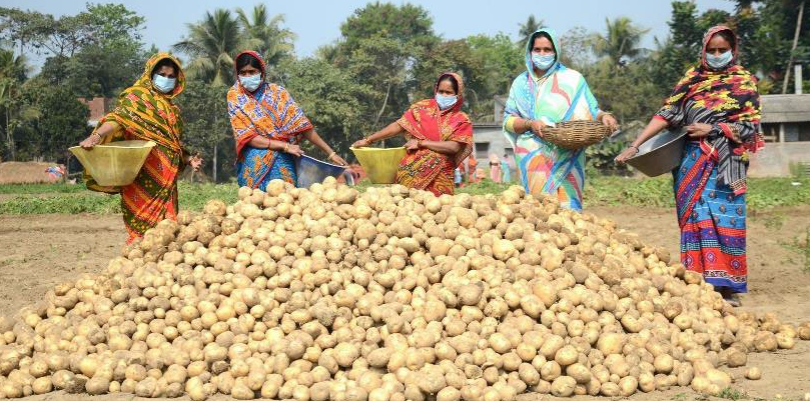Between 2019 and 2023, USAID and PepsiCo partnered to test the business case for women’s empowerment in the PepsiCo potato supply chain in West Bengal, India. Women are heavily involved in potato farming in West Bengal but often in overlooked areas of work such as seed cutting and seed treatment, which are typically done at home. As a result, most PepsiCo registered farmers are men. The partnership hypothesized that increasing women’s visibility and participation in PepsiCo’s supply chain would positively contribute to important tangible and intangible business metrics for the company, including increased productivity and profitability for farming families, adoption of sustainable farming practices, increased supplier base size and retention, and improved brand loyalty. The four-year partnership, implemented through the Integrated Land and Resource Governance (ILRG) program, worked with women and men farmers in 11 target communities, as well as with PepsiCo employees to increase gender equality awareness and women’s access to productive resources. Activities with men
and women farmers included:
- Agronomy training for 1,888 women farmers;
- Deployment of 17 women Community Agronomists (CAs) to increase outreach to women;
- Support to seven women’s land leasing groups (LLGs);
- Land literacy training for 838 farmers (542 women and 296 men);
- Support to 11 women-led demonstration farms that showcased proper PepsiCo practices, visited by 305 people (225 women and 80 men);
- Entrepreneurship training for 26 people (21 women and 5 men); and
- Gender norms training for 289 farmers (174 women and 115 men).
In addition, ILRG also strengthened the gender capacity of all PepsiCo staff in West Bengal through in-person training on gender equality, women’s empowerment, and gender-based violence (GBV), asynchronous microlearning via WhatsApp, the development of written resources, and ongoing mentoring and support.
ILRG collected quantitative and qualitative data to measure impacts related to women’s empowerment and business results. The project-level Women’s Empowerment in Agriculture Index (Pro-WEAI) assessment found that overall women’s empowerment decreased for all women in the region from baseline to endline, which could be attributed to the economic and social repercussions of the COVID-19 pandemic. Although the Pro-WEAI empowerment score worsened for both women in the treatment and control groups, the decline was less pronounced for women in the treatment group, suggesting ILRG interventions could have provided some protection for women’s empowerment in a challenging environment. The broader body of quantitative and qualitative data collected shows progress in specific domains of women’s economic empowerment (WEE), including self-efficacy and confidence, access to knowledge, control of resources, control of income, decision-making power, acceptance by family and community members, and collective agency. There was a notable shift in women being recognized as farmers, instead of “farmers’ wives.” Women reported greater decision-making power over decisions related to the use of land, agriculture production, and use of income. Influential male champions were crucial to shifting harmful gender norms at the community level through positive role modeling and helping project staff overcome initial resistance of some men to the activities.
The data shows positive business results. Over 97 percent of women applied skills gained through agronomy training, positively impacting potato productivity and profitability. Families with trained women had better gross and net yields. In Year 4, 84 percent of women farmers reported an increase in their farm yield compared to the previous year, 76 percent reported a decrease in rejection rates, and 77 percent reported experiencing a positive change in their household income since associating with PepsiCo. The overall Sustainable Farming Program (SFP) score improved by 170 percent in the target communities but remained low compared to other areas (overall sustainability score of 74 percent versus 77 percent in Year 4). There is emerging evidence that reaching and empowering women can lead to greater stability and growth of the PepsiCo supply base in West Bengal, with women joining the supply chain at a higher rate than men. Additionally, women have been responsible for recommending PepsiCo potato cultivation to others. Finally, the data shows a marked shift in PepsiCo’s staff attitudes, knowledge, and behaviors toward gender equality. At the end of the project, 76 percent of PepsiCo staff agreed that women’s participation adds value to the business and 84 percent said they observed positive changes in farming communities or PepsiCo’s business metrics that they attribute to women’s empowerment activities.
Despite challenges related to the COVID-19 pandemic and untimely rains that led to significant losses in Year 3, the results demonstrate that there is a business case for promoting women’s empowerment in PepsiCo’s potato supply chain in West Bengal and potentially in other markets with a similar supplier model. However, some elements of the project proved difficult to pursue, such as the land component. There is room for improvement and a need for better data points for future and continued assessment. These areas include early alignment on business case elements and sustainability of interventions; strengthening women’s ownership, access to, and control over land; promoting equitable work sharing at the household level; increasing women’s representation in the entire supply chain (as suppliers, aggregators, and PepsiCo staff); and setting up efficient data monitoring and governance processes.


